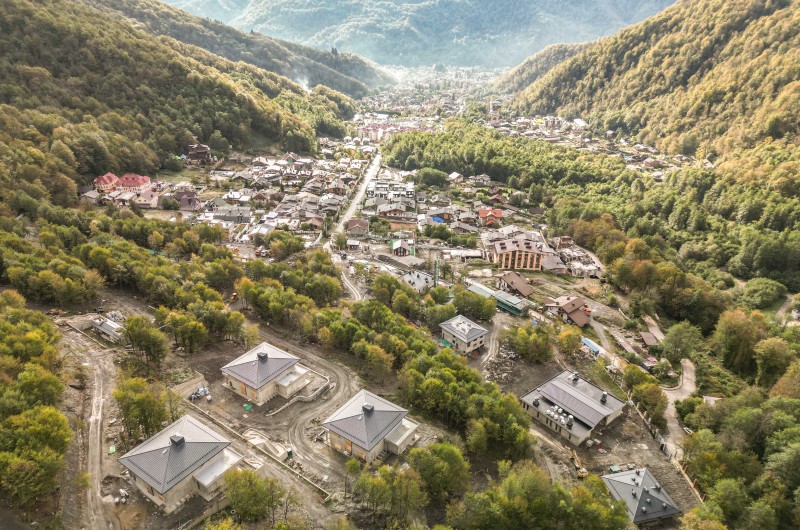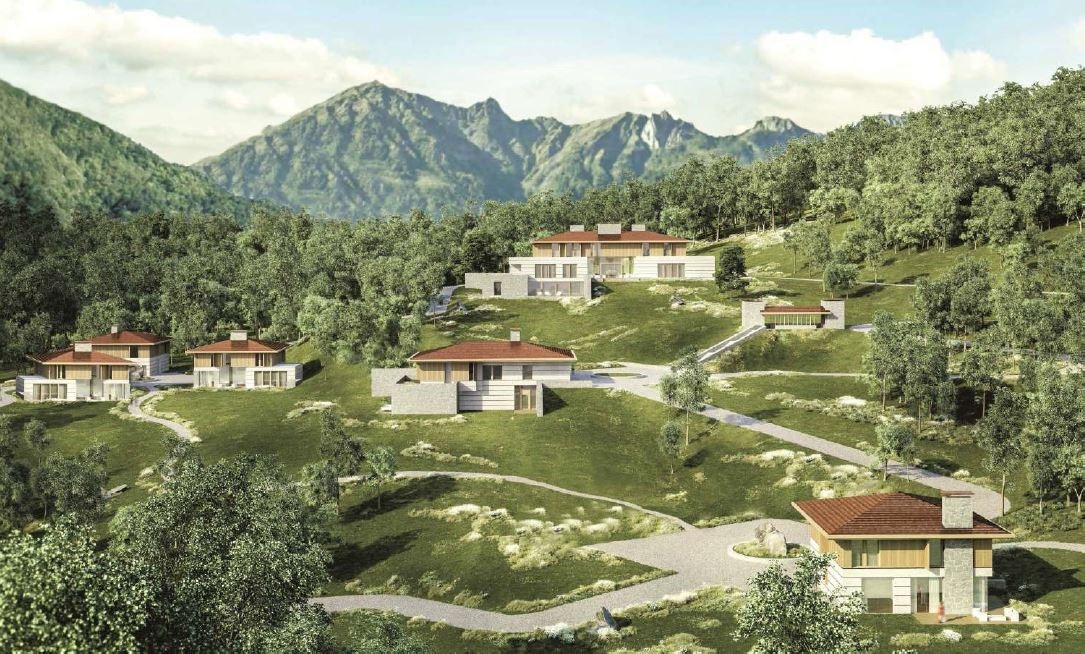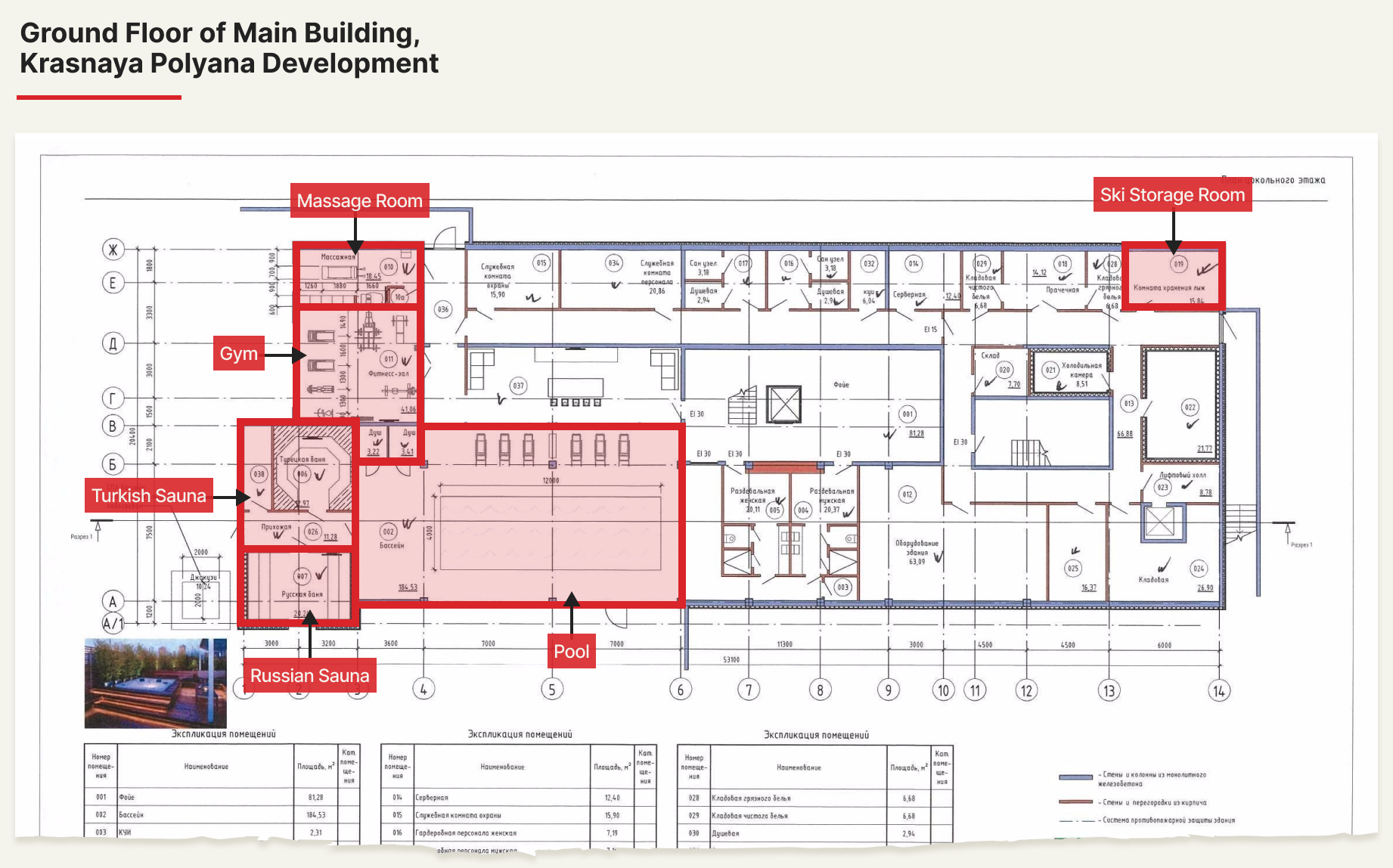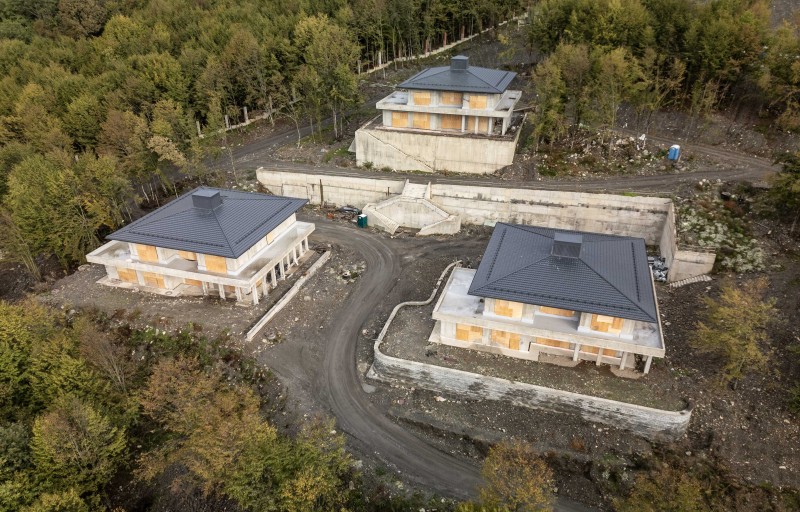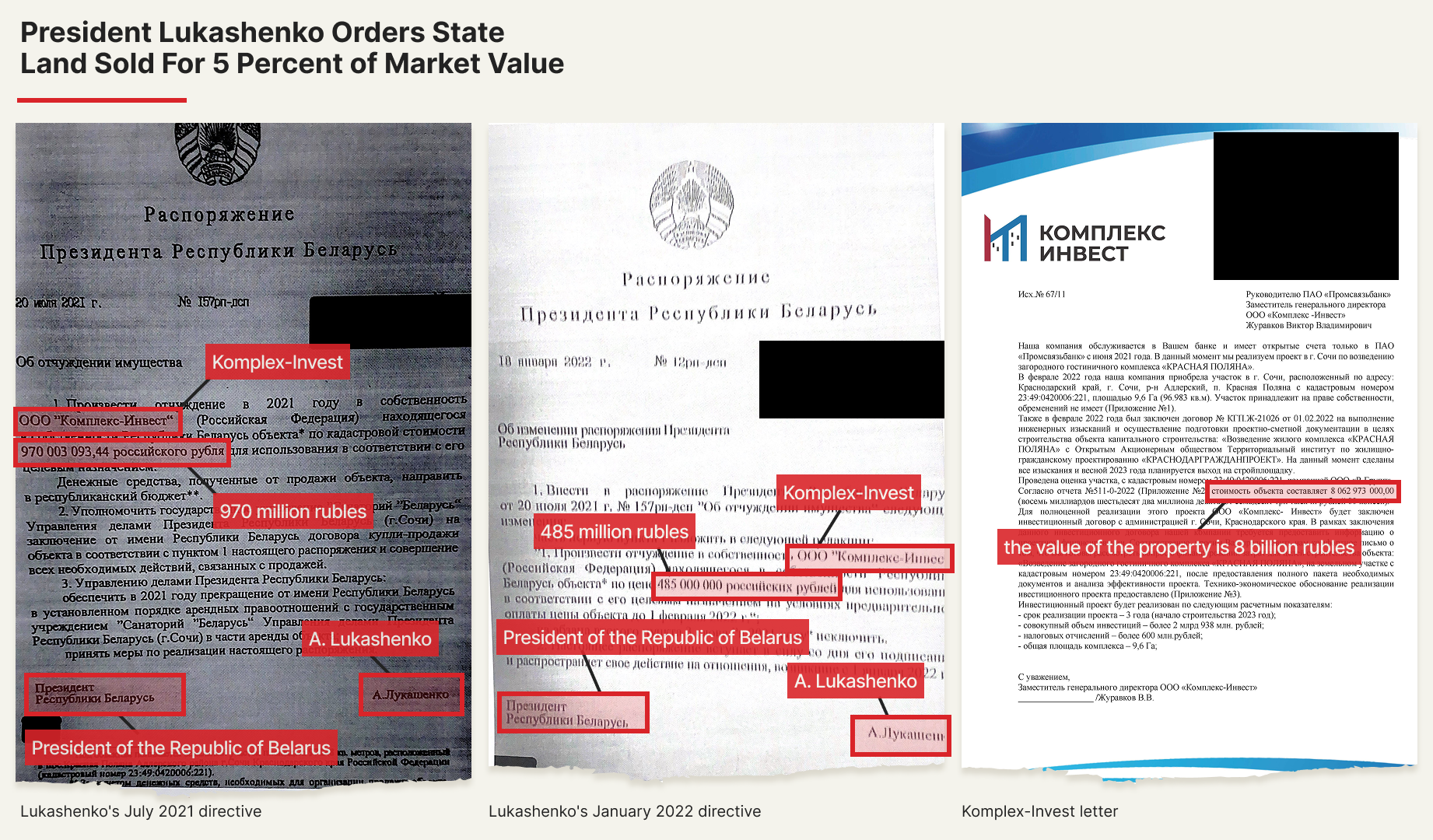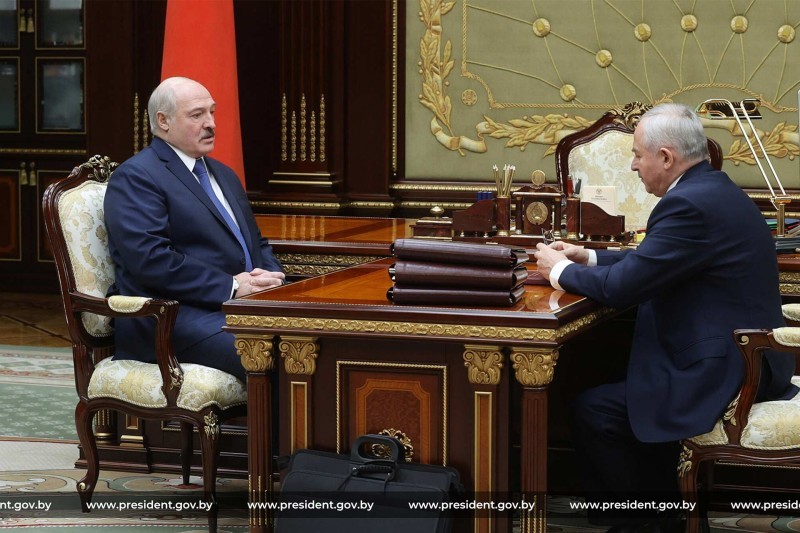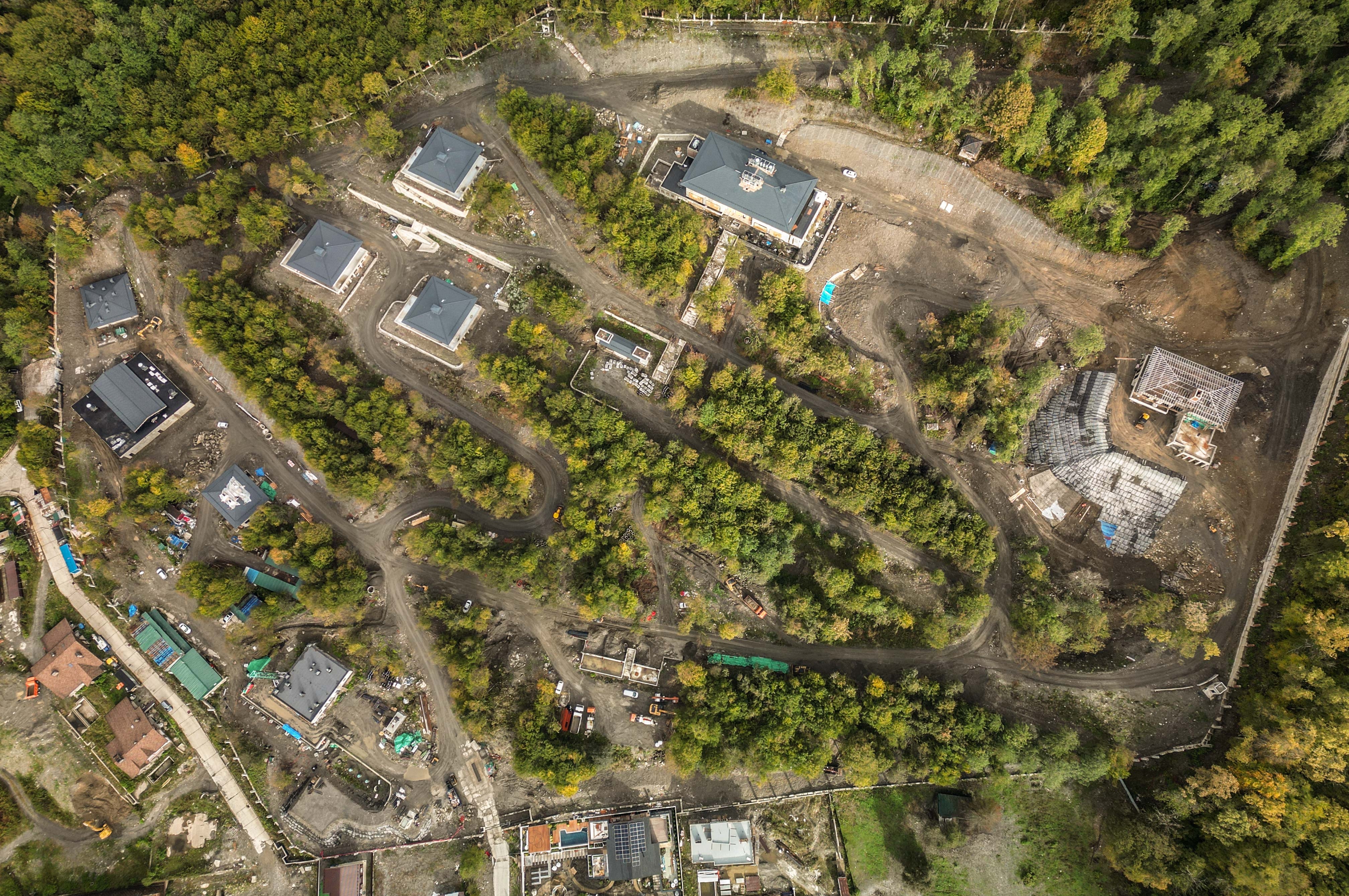Reported by
In the exclusive Russian ski resort town of Krasnaya Polyana, nestled against the towering Caucasus Mountains, an elite new development is rising.
Its location is world-class: The snow events of the 2014 Winter Olympics were held minutes away, the Black Sea beaches and the resort city of Sochi are a 40-kilometer drive, and one of Europe’s largest forested nature preserves is right next door.
But there are signs that the development — billed as a “hotel complex” in planning documents — now rapidly nearing completion, will be much more than just another VIP skiing destination. Documents show that the 10-hectare site will include an anti-ram steel fence, six guard posts, thermal imagers, a drone-suppression system, and technology to detect radioactive materials.
Who are these draconian security measures for? There is no indication that Vladimir Putin is behind the development — the Russian president once had a residence in nearby Sochi, but he reportedly stopped visiting in fear of drone attacks.
Instead, the signs all point to neighboring Belarus and its dictatorial president, Alexander Lukashenko.
A conceptual rendering of the envisioned Krasnaya Polyana development.
The project was investigated last year by BelPol, a team of former Belarusian law enforcement officers who oppose Lukashenko’s regime, along with journalists from Belsat TV.
They found that the site, formerly owned by the Belarusian government, had been transferred to a private Russian company on Lukashenko’s personal orders, and at a remarkably low price. Behind that company were people closely tied to Viktor Sheiman, a longtime Lukashenko ally who is sometimes referred to as his “right-hand man.”
Now, documents obtained by reporters from the Belarusian Investigative Center (BIC) show how the elite complex was paid for and who owns it today. The owner since February 2024 is Aleksandr Romanovsky, a man who once worked for Lukashenko’s personal security service. And the money, documents show, came in the form of at least $35 million in loans.
Reporters were able to trace the origins of about $16 million of that amount, finding that the money came from people and companies with close regime ties. Among these is Romanovsky himself, who lent nearly $4 million to his own company.
Many of the other lenders lead, once again, to Sheiman. They include a Cyprus company represented by his former deputy in an influential government agency and a Belarusian company headed by the “senior inspector” of a security firm he reportedly controls. The largest known lender was a Hong Kong company that served as an intermediary in a scheme to sell contraband Turkish chicken feet in China. This complex system also revolved around Sheiman, as previously reported by BIC.
There is no direct evidence that the Krasnaya Polyana complex is intended to serve as Lukashenko’s personal residence in Russia. But a former bodyguard for top Ukrainian officials, who spoke to reporters on condition of anonymity, said the security arrangements suggested that the property would be used by someone “with huge money, or at the level of a president or prime minister.”
Belarusian president Alexander Lukashenko delivers a speech at the inauguration of the Belarusian National Football Stadium in Minsk, Belarus, on June 7, 2025.
“The advantage of such a scheme usually lies in the fact that everything is under control,” said Alena Vandysheva, director of the exiled Russian branch of Transparency International. “Authoritarian leaders in particular think that there should be nothing that can go wrong, nothing unpredictable,” she said. “That’s why they chose those close to them — the ones they trust, the ones who have already proven themselves.”
One date is certainly suggestive: The company behind the Krasnaya Polyana development took possession of the land on February 18, 2022 — just days before Russia’s full-scale invasion of Ukraine, in which Belarus played a substantial part.
All of the individuals named in this story who could be reached by reporters denied any involvement.
Swimming Pools and Banquet Halls
The large scope and luxury of the Krasnaya Polyana complex are impressive. According to an investment website run by the city of Sochi, the 2.3 billion ruble ($28 million) development will employ 40 people and consist of “31 VIP rooms, 3 VIP villas, a hotel/restaurant complex, a garden house with a barbecue area,” and other facilities.
Draft interior layout designs obtained by reporters show that the three-story main building, with a floor area of over 2,700 square meters, will feature Turkish and Russian saunas, a gym, a swimming pool, a movie theater, and a banquet hall.
A draft design of the ground floor of the main building includes various amenities. The banquet hall and movie theater are on the second floor.
Three additional villas, more modest than the main residence, are still over 700 square meters in size. Each one will have four bedrooms and its own swimming pool and sauna. A separate building hosts additional suites and a restaurant; there are also multiple living quarters for personnel.
Drone footage obtained by reporters in October 2025 showed that construction was well advanced and in full swing.
A drone view of the three smaller villas under construction in the Krasnaya Polyana complex, taken in October 2025.
State Land Sold for 5 Percent of Market Value
For years, the site of the development had been the property of the Belarusian government, which acquired it in 2009 in a land swap with Russia.
As of 2021 it was held by Belarus Sanatorium, a government institution that operates several recreational facilities nearby and falls under the sprawling Property Management Department of the President of the Republic of Belarus.
But that year, in a secret directive obtained by reporters, Lukashenko ordered the land to be sold to a recently-established Russian company called Komplex-Invest. The price was set at 970 million rubles ($13 million) — the official cadastral level, and far below market value. In a follow-up directive, Lukashenko cut the already low price in half to 485 million rubles ($6.4 million).
At that price point, Komplex-Invest got ahold of the Belarusian state land for about 20 times less than its market value. According to a letter authored by the company and obtained by reporters, an external evaluation valued the property at just over 8 billion rubles ($131 million).
The contract for the transaction confirms that the sale was made at the exact price Lukashenko had ordered. It shows that the actual sale took place on February 18, 2022, just days before Russia’s full-scale invasion of Ukraine.
Documents obtained by reporters show how Lukashenko ordered the state-owned land in Krasnaya Polyana sold for a fraction of its market value.
All Roads Lead to Sheiman
At that time, the owner of Komplex-Invest was a woman with the classic profile of a proxy: Elena Borteva was a 65-year-old pensioner with no history of having worked in property development, and no logical reason to be the owner of a multi-million-dollar resort development.
But Borteva does have a family connection to regime circles. Her brother-in-law Vladimir Yaprintsev is a onetime Soviet martial-arts champion who co-owned a major Belarusian company with Yury Chizh, a now-disgraced oligarch once considered close to Lukashenko.
Borteva didn’t own the expensive land for long. Just a few months after Komplex-Invest acquired it, her share in the company was reduced to a tenth of one percent. The rest was taken over by a Belarusian company called Regionalny Poryadok. As BelPol reported, its head, Viachaslau Vasilyeu, was a “senior inspector” for a privileged, regime-connected private security company called Gardservis.
Journalists have linked Gardservis, which has sometimes been compared to the Russian Wagner paramilitary group, to Viktor Sheiman, Lukashenko’s “right-hand man.” It is owned on paper by one of Sheiman’s longtime associates, but leaked internal memos show its managers reporting directly to Sheiman.
The Sheiman connection ties the Krasnaya Polyana residence to one of Lukashenko’s oldest allies. An army general and veteran of the Soviet war in Afghanistan, Sheiman became close to the Belarusian president as he consolidated power in the 1990s, taking on a role as a kind of regime enforcer. He is sanctioned by the U.S. for undermining Belarus’s democracy, by the EU and the U.K. for his role in disappearing dissidents, and by Canada for “gross human rights violations.” According to previous investigations, Sheiman has secretly profited from foreign trade deals he negotiated for the Belarusian government and has been involved in sanctions evasion.
From 2013, Sheiman headed the presidential Property Management Department, which owns dozens of businesses and has a wide remit, including supporting the “functioning of the national organs of government.” It reports directly to Lukashenko. Sheiman abruptly resigned from this position in 2021. But in a video released by state media, Lukashenko told him to “not to go too far … and to lend a shoulder where it is necessary, as you have always done.”
Belarusian President Alexander Lukashenko (left) with Viktor Sheiman (right) as the latter announces his retirement.
Indeed, Regionalny Poryadok is not the only place Sheiman’s name appears in the story of Komplex-Invest. BelPol researchers said they had obtained numerous documents showing that the Russian company received instructions from another Belarusian firm called Vector Capital Group — and that Sheiman was behind it, playing a managerial role in the construction of the residence.
One document they showed on-screen is a letter in which Vector Capital instructs Komplex-Invest on how to structure its labor contracts. The letter conveys the views of Vector Capital’s head and identifies him with the abbreviation “V.V.Sh.,” which matches Viktor Sheiman’s initials.
A separate Komplex-Invest document — a staffing plan that lists prospective employees and their salaries — is co-signed by Sheiman. In addition, as reported in a previous investigation, two of Vector Capital’s consecutive directors had been Sheiman’s former deputies at the Property Management Department
When contacted by reporters, Vasilyeu told reporters they had confused him with someone else and did not answer any further questions. Sheiman did not respond to a request for comment.
Covered by Loans
The Sochi investment site lists the cost of the Krasnaya Polyana complex as 2.3 billion rubles ($28 million); documents obtained by reporters show that about $19.5 million had been spent by the end of 2024. Where did this money come from?
According to a Russian tax service document obtained by reporters — a record of an interview with Komplex-Invest director Alexey Prudnikov — all of the company’s expenses were covered by loans.
Almost every single one that could be identified by reporters had a link to Lukashenko or Sheiman.
The $6.4 million Komplex-Invest spent to acquire the land from the Belarusian government, for example, came from Regionalny Poryadok, the Sheiman-linked company that acquired Komplex-Invest shortly afterwards.
But in February 2024, reporters found, Komplex-Invest got a new owner: A former employee of Lukashenko’s security service named Aleksandr Romanovsky.
According to an internal Komplex-Invest document, Romanovsky was also one of the lenders, providing his own company with a total of 360 million rubles ($3.9 million). He could not be reached for comment.
A drone view of the entire Krasnaya Polyana complex, taken in October 2025.
Another 126 million rubles ($1.5 million) was loaned by Rostumel Holding Limited, a Cyprus-based company that previous investigations have linked to sanctions evasion. A power-of-attorney document obtained by reporters shows that Rostumel’s financial director, Andrei Svirydau, was granted extensive authority to act on its behalf. Svirydau was Sheiman’s onetime deputy at the Property Management Department and, for several years, the director of his Vector Capital Group. Svirydau did not respond to emails requesting comment.
Another 33 million rubles ($4.8 million) came from M.R.I.S. Group, a Russian company owned by Viktar Zhuraukou, the son of one of Sheiman’s predecessors at the Property Management Department. When reached by reporters, Zhuraukou refused to answer questions.
But the largest lender uncovered by reporters, loaning Komplex-Invest 929 million rubles ($10.2 million), is based far away overseas. Winshun Trade Limited LLC is a Hong Kong company that, according to a previous investigation by BIC, was an intermediary in a scheme through which Turkish chicken wings, falsely labeled as Belarusian, were smuggled into China.
Even here, there are links to Sheiman: In 2023, one of Winshun’s owners was a nephew of Siarhei Anoshka, who worked under Sheiman at the Property Management Department and in his Vector Capital Group.
